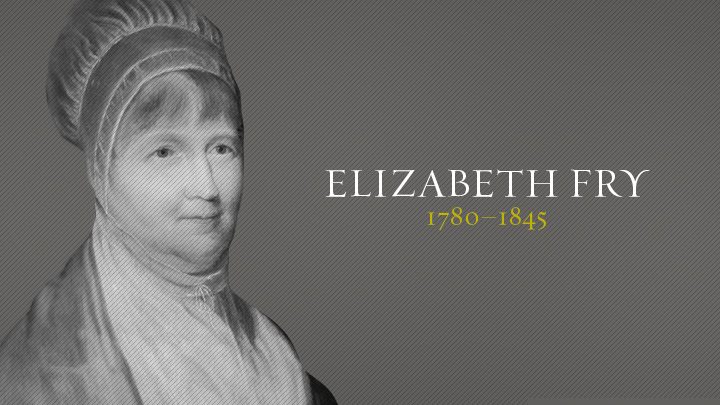" … to form in them, as much as possible, those habits of sobriety, order, and industry, which may render them docile and peaceable while in prison, and respectable when they leave it."
In the early 1800s, English prisons were pits of indecency and brutality. The idea was to punish, not reform prisoners. Most people thought this was the way things should be or believed nothing could be done to change the entrenched system. Elizabeth Fry disagreed on both accounts and pushed for a number of prison reforms we still practice today.
Horrifying conditions
The daughter of an English banker, the 20-year-old Elizabeth married Joseph Fry, a wealthy tea dealer. Children came quickly, eventually numbering 11. When she had rededicated her life to Christ at age 18, she wanted to help the downtrodden. So as a young bride and mother, she gave medicine and clothes to the homeless and helped establish the Sisters of Devonshire Square, a nursing school. In 1813, at age 33, her attention turned to the female prisoners in London's Newgate prison. She began to visit the prison almost daily, and what she found there horrified her.
At Newgate, women awaiting trial for stealing apples were crammed into the same cell as women who had been convicted of murder or forgery (both capital crimes). Women ate, defecated, and slept in the same confined area. If an inmate had children, they accompanied her to prison and lived in the same inhumane conditions. For those without help from family, friends, or charities, the options were to beg and to steal food, or to starve to death. Many women begged for alcohol as well, languishing naked and drunk. The sight of children clinging to their mothers as they were dragged to the gallows was a scene replayed time and again.
Better life for inmates
Prison officials warned Fry of the risks she was taking in visiting prisons (exposure to violence and disease), but she waved the warnings aside. Besides comforting women, she taught them basic hygiene and to sew and quilt (so they might earn a living when they were released). She read the Bible to inmates and gave Bibles away. She intervened for women on death row, and if her pleas were unsuccessful, she accompanied women to the scaffold and comforted them in their last moments.
Timeline |
|
|
1740 |
Great Awakening peaks |
|
1759 |
Voltaire's Candide |
|
1771 |
Francis Asbury sent to America |
|
1780 |
Elizabeth Fry born |
|
1845 |
Elizabeth Fry dies |
|
1851 |
Harriet Beecher Stowe releases Uncle Tom's Cabin |
To expand her efforts, in 1816 she founded the Association for the Improvement of the Female Prisoners of Newgate "to provide for the clothing, instruction, and employment of the women; to introduce them to a knowledge of the Holy Scriptures, and to form in them, as much as possible, those habits of sobriety, order, and industry, which may render them docile and peaceable while in prison, and respectable when they leave it." Specific reforms she campaigned for included: separation of men and women prisoners, paid work for inmates, women guards for women prisoners, and the housing of criminals based on their crimes.
Beyond Newgate
To nineteenth-century observers, Fry's efforts produced a miracle: many of the reportedly wild and incorrigible inmates became, under her care, orderly, disciplined, and devout. Mayors and sheriffs from surrounding regions visited Newgate and began initiating reforms in their own prisons. In 1818 Fry gave testimony before the House of Commons on the state of English prisons, which contributed to the Prison Reform Act of 1823.
Fry's concern extended to women in half-way houses, where she introduced education, discipline, and Bible instruction. She helped establish a night shelter in London (1820) and formed societies to minister to vagrant families. She also promoted her prison reform ideas in France, Belgium, Holland, and Germany. Until her death in 1845 at age 65, she visited every convict ship that carried female prisoners to the British colonies.
Fry's ideas inspired subsequent generations to combine social work and gospel proclamation and reshaped how prisoners have been treated, ever since.
Corresponding Issue











